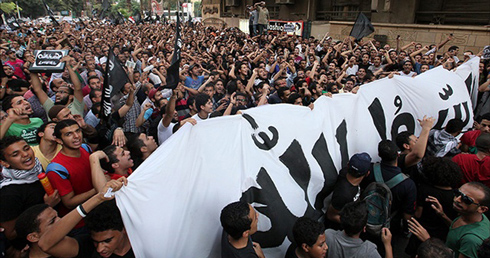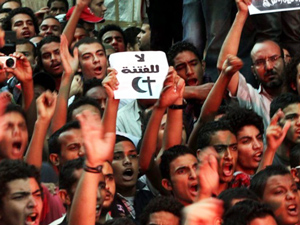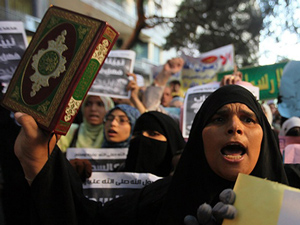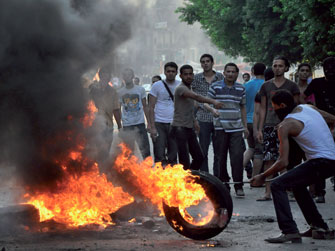Demonstrations against U.S. spread across the Muslim world and Africa
By Brian E. Muhammad -Contributing Writer- | Last updated: Sep 23, 2012 - 3:24:42 AMWhat's your opinion on this article?
When and how will it end and what does it mean for President Obama?

Egyptian protesters hold a giant banner reading ‘the Prophet’ in Arabic during a protest in front of the U.S. embassy in Cairo. Anger has spead across the Muslim world after a film ridiculing Islam’s Prophet Muhammad was produced in the U.S. Photo: MGNOnline/Khaled Elfi qi/EPA
|
(FinalCall.com) - As unrest intensified by the day, the American public struggled to understand a violent eruption of anti-American anger directed at the United States government in dozens of countries worldwide. Violence sparked by a movie that denigrated the prophet of Islam.
Mass demonstrations began as Americans were observing the 11th anniversary of the tragic 9/11 terror attack on the World Trade Center and Pentagon that claimed 3,000 lives in 2001.
Protesters converged on U.S. embassies and consulates, stoning property, tearing gates down and stomping and burning American flags in reaction to a U.S. made anti-Islam film, “The Innocence of Muslims,” that depicts Islam’s Prophet Muhammad as a decadent immoral figure. The “mediocre” film reportedly cost $5 million to produce and was translated into Arabic then distributed throughout the Muslim world via YouTube.com.
In Beirut, Lebanon, the leader of Hezbollah spoke publicly Sept. 17 calling for increased protests. “The world should know our anger will not be a passing outburst but the start of a serious movement that will continue,” Sheikh Hassan Nasrallah said before a crowd of thousands of Lebanese protesters, according to the Associated Press.
“America, which uses the pretext of freedom of expression ... needs to understand that putting out the whole film will have very grave consequences around the world,” said Sheikh Nasrallah, who has been in hiding since Hezbollah’s war with Israel in 2006, AP reported.
The Lebanese protests followed deadly protests in Libya, as well as Egypt, Yemen, Sudan, Nigeria, Tunisia, Pakistan, Afghanistan, Indonesia, Australia and other nations. Muslims in European nations also turned out to protest the film. U.S. entities found themselves subject to attack and protestors died in several clashes as host governments tried to protect U.S. embassies.
However observers cautioned the upset runs deeper than the film alone.
Several analysts discussed the meaning and implications for the crisis for Washington, the Western world and the effected regions.
“It’s a reflection of Islamaphobia in the United States,” said Dr. Gerald Horne, professor of history and African American studies at the University of Houston.
“It’s well known that because of a very peculiar interpretation of the first amendment of the U.S. constitution, that Islamaphobes have been able to run riot as far as very disgusting depictions of Muslims, and this so-called video that’s running on YouTube is an example.”

An Egyptian protester holds a placard reading in Arabic ‘no to sectarian strife’ during the protest, Photo: MGNOnline/EPA
|
“These region wide demonstrations are an indicator of the deep anger and resentment against the United States and the former colonial powers who are seen today—even after the formal end of the colonial era—to be the enforcers of a policy of empire in this geo-strategically important and resource rich part of the world.”
In fact the United States only has one “bipartisan foreign policy and it’s called empire,” noted Bruce Dixon, managing editor of Black Agenda Report.com.
Mr. Becker said Western interventions in Iraq, Libya and Afghanistan, drone aircraft killings and the use of CIA operatives and private contractors for covert military operations in the region inevitably produced outrage.
All the analysts agreed the outrage should be understood in a larger narrative about America’s global meddling, resource plundering and support of repressive rulers. The West is reaping the consequences of what it sowed of destruction and imperialism, they said.
“It’s a time of change,” commented peace advocate and former U.S. Attorney General Ramsey Clarke.

An Egyptian protester holds a copy of the Qur’an during a protest in front the US embassy in Cairo, Egypt. Photo: MGNOnline/Khaled Elfi qi/EPA
|
“I believe violence is the ultimate human degradation. But human nature can only stand so much injustice before it breaks out in violence,” he said.
The most dramatic outcome of the uprisings at press time for America were the deaths of J. Christopher Stevens, the U.S. ambassador to Libya, and three consular personnel in an evening attack on the U.S. consulate in Benghazi, Libya. Mr. Stevens was Washington’s “go to man” for insurgents in the overthrow and assassination of Libyan leader Muammar Gadhafi in October 2011.
Although President Obama vowed, “No acts of terror will ever shake the resolve of this great nation, alter that character, or eclipse the light of the values that we stand for,” the spontaneity of the furor has bewildered the world’s most powerful nation. However, “there should be no perplexity; there should instead be comprehensive understanding on what’s going on,” said Dr. Horne.
During an October 25, 2011 interview with Cliff Kelly, Minister Louis Farrakhan of the Nation of Islam cautioned those who were celebrating the death, destruction and killing of Libyan leader Muammar Gadhafi and destabilization of the country.
He warned that losses would follow the assaults on Libya and bring “sorrow and great pain.”
Considering the timing of the attack, Libyan and some American officials raised questions about the possibility of a calculated plot. Libyan officials described the Benghazi assault as “professional and well-coordinated” creating doubt it was part of global reaction to the film. Other observers argued the move was a planned hit on the Americans in the ongoing chaos plaguing Libya since the NATO-induced fall of Col. Gadhafi.
“This wasn’t a group of individuals who ran down to the garage and picked up a few AK-47s and showed up and started shooting at a consulate,” argued Rep. Mike Rogers (R-Mich.), who chairs the House Intelligence Committee. “This was clearly a planned, coordinated event that took place on 9/11.”
The consulate attack comes as the new U.S.-backed regime in Libya lacks control over the whole of the country. Some experts see the attack as a blowback on America by Al-Qaeda elements the U.S. “partnered” with in the coup against Col. Gadhafi. Anti-Gadhafi “militias” in Libya, once supported by the U.S. and NATO, are now a myriad of autonomous and heavily armed groups inside the country.
Mr. Dixon pointed out that America has employed the same group in pushing regime change in Syria.
“These are people that sometimes work for Uncle Sam and sometimes not,” he said. “These are the kinds of things that our tax dollars have unleashed in that part of the world and if we were not so intent on destabilizing every country we had a disagreement with then Al-Qaeda would not exist and this thing would never have happened.”
Africa political analyst Gamal Nkrumah, in a telephone interview with The Final Call from Cairo, Egypt, said animosity toward America is not limited to those the West sees as fanatical Muslims. Anti-Americanism runs very deep, he said. “Right across the political spectrum; nobody likes America, that’s basically the bottom line in this part of the world,” he said.
Mr. Nkrumah, a son of the late Pan African leader and first independent president of Ghana, Dr. Kwame Nkrumah, explained that in Egypt frustration and thwarted expectations from the January 2011 “revolution” and ouster of longtime dictator Hosni Mubarak factor in the hatred of America. Many hoped with the fall of Mr. Mubarak—a U.S. ally—life would change, “but it didn’t,” he said.
Then there is the belief that the revolution was hijacked by the Muslim Brotherhood with the tacit support of America, leading to the Brotherhood assuming power, Mr. Nkrumah continued. However the Egypt-U.S. relationship is strained over the embassy protests.
‘‘Generally speaking neither the economic nor social conditions have changed for the better,” explained Mr. Nkrumah. That adds fuel to the anger of the people, he said.

Egyptian protesters burn tires as they clash with riot police, unseen, outside the US embassy in Cairo, Egypt, early Sept. 13. Photo: AP Wide World Photos/Hussein Tallal
|
Here it’s a “chain of events whereby the United States, the Pentagon and probably other western NATO powers are resorting to covert and overt, on the ground military operations, indicating these countries do not have true sovereign control over their land, labor and resources,” said Mr. Becker.
President Obama is in a precarious position. Some say he squandered trust and credibility enjoyed in Africa and the Middle East, where he symbolized hope for a new and improved America foreign policy after his 2008 election.
These events have pushed the Obama administration into major crisis mode weeks before U.S. national elections.
The tumult comes as President Obama seeks re-election and Republican opposition candidate Mitt Romney is looking to unseat the first Black head of state. Republican pundits are accusing President Obama of compromising U.S. strength in predominate Muslim lands, leaving America weak and vulnerable. However, his actual record doesn’t bear that out, said one analyst.
“It’s traditional for the Republicans to say we’re more bloodthirsty than the Democrats. The problem with that this year is that Obama has killed more people overseas than Bush has,” argued Mr. Dixon.
“In a larger sense its impact on the elections in the United States is not significant in terms of who wins or loses, but in terms whether U.S. policy changes … to a more humane policy, a more decent and honorable policy,” said Mr. Clarke.
Only time will tell if the events will affect President Obama’s reelection bid.
Mr. Obama’s dilemma is also not necessarily a new one for America: “There’s a deep ongoing contradiction rooted in the age old struggle to be free from colonialism and foreign domination … (that) should be understood as the base of the current conflicts,” said Mr. Becker, of the anti-war A.N.S.W.E.R. Coalition.
Related news:
The Muslim World Explodes: 'Failing To Learn the Lessons of History' (FCN, 09-21-2012)
Anti-Muslim, anti-Arab sentiment still climbing (FCN, 09-03-2012)
'Fear, Inc.' driving anti-Islam views in U.S. (FCN, 09-30-2011)
Anti-mosque groups push campaign in New York (FCN, 09-06-2010)
Rejecting bigotry and targeting of Muslims (FCN, 09-06-2010)
Is Islam a Religion of Violence? (FCN Webcast, Min.Farrakhan, Press Conf. 05-25-2005)
INSIDE STORIES AND REVIEWS
-
-
About Harriett ... and the Negro Hollywood Road Show
By Rabiah Muhammad, Guest Columnist » Full Story -
Skepticism greets Jay-Z, NFL talk of inspiring change
By Bryan 18X Crawford and Richard B. Muhammad The Final Call Newspaper @TheFinalCall » Full Story -
The painful problem of Black girls and suicide
By Charlene Muhammad -National Correspondent- » Full Story -
Exploitation of Innocence - Report: Perceptions, policies hurting Black girls
By Charlene Muhammad -National Correspondent- » Full Story -
Big Ballin: Big ideas fuel a father’s Big Baller Brand and brash business sense
By Bryan Crawford -Contributing Writer- » Full Story






 Click Here Stay Connected!
Click Here Stay Connected!








